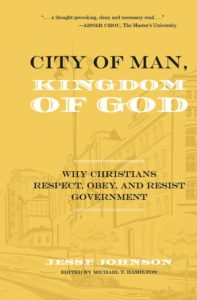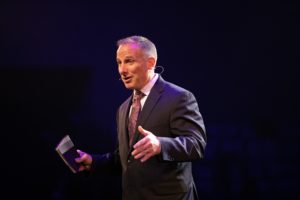What is the Christian’s relationship with the government? When do Christians submit to the government and when do they resist? Jesse Johnson found himself asking those questions more and more during the COVID-19 lockdowns in 2020 as churches across the country faced something unprecedented: governing officials forbidding them from meeting for in-person services. As the pastor of Immanuel Bible Church in Springfield, Virginia, a few miles south of the nation’s capital, Jesse regularly interacts with government officials and cares deeply about the relationship between politics and the church. In an attempt to answer his own questions about that relationship, and serve Christians everywhere wrestling with that issue, Jesse wrote City of Man, Kingdom of God: Why Christians Respect, Obey, and Resist Government. It was released in August of this year and is available here.
Jesse, an alumnus of TMS, graciously answered a few questions about his book:
Why did you decide to write this book? What did you see in the evangelical church that made you want to write about the Christian’s relationship with government?
“When the COVID lockdowns started, I began looking for resources that might help Christian leaders think through government regulation of church worship. I couldn’t find anything useful written more recently than the Puritan era. So, I started putting together resources for the elders at my church, and then started sharing those resources with other churches. This book was a result of that effort to serve churches during COVID.
That said, this book is not about COVID. It is about the transcendent principles behind God’s design for government. In the same way, it is not expressly about Christian nationalism, but rather it’s a deliberate attempt to return to principles that were commonly taught and understood by Christians a few hundred years ago.
Today, many Christians are biblically illiterate when it comes to government. When everything is politicized, nothing is principled. But government regulating church worship is not new, and this book is an attempt to get us back to the era of the non-conformists, who had similar encounters with government as the American church over the last few years.
In the first third of the book, you talk about God’s original design for government. What’s a common way Christians often misunderstand the role of government?
“Many, if not most, American evangelicals say “obey the government at all times, unless it tells you to sin.” That is the understanding of government taught by Lutherans (in the Augsburg Confession), but that is not the Puritan or non-conformist view of government. Simply put, “obey at all times” gives government a level of deference owed only to God, not to man. Yes, we are to pay taxes, and yes we are to honor government when it is functioning as God appointed it to function. But the notion that government can compel obedience when it leaves God’s design is foreign to Scripture.
What if the government tells pastors they can’t preach within a five-mile radius of their homes? Is it “sinful” to live more than five miles away from your church? Of course not! But that kind of law—which, by the way is a real law, passed under King Charles II in 1665—shows the inadequacy of the “obey government unless it commands sin” rubric.
God has designed government for specific purposes (to protect worship, protect food, protect families, and protect life). When it does those things, it is acting as God’s servant.”
That phrase, “Obey the government unless they tell you to sin” has almost become an evangelical cliché inrecent years. Why is that such a popular way of thinking about the government?
“It is an easy phrase to understand, and it is engrained in the American evangelical psyche. It was commonly taught in the 1800’s America, in a way that I think was used to justify slavery. The logic was as simple as it was shallow: God allowed slavery in the Old Testament, so it is not sinful, thus you should obey the government, even if it tells you that you are enslaved, and to resist that is to resist God. But as I mentioned, this was not the Puritan view of government, and obviously was not the view of government held by the abolitionists or non-conformists.
Many Americans fall into that view not because they love slavery, but because they love their country. It is amazing to me how many people who would not think twice about smuggling Bibles into China or tools to build churches into Cuba, suddenly say “obey the government” when it is the American government that says you cannot have a prayer meeting in your home or hymnals in your church.”
Does the Christian’s relationship with government change depending on the type of government they live under? For instance, should Christians relate differently to a monarchy than they do a democracy?
“There are certain tendencies in a democracy that aren’t there in an absolute monarchy. If you have a vote, you feel like you have a voice, and then it becomes a stewardship of that voice to advocate for policies that protect your neighbor. But with that stewardship we can too easily feel like every election is the most important election in our country’s history!!! So living in a democracy gives us certain freedoms, but also makes us prone to becoming disproportionately invested in political outcomes.
Whether living in a democracy or monarchy, the biblical principles remain the same. I talk in the book about how Christians should interact with injustice. Those principles are drawn largely from Ecclesiastes 8, which was written by Solomon in the context of a monarchy. Yet they translate easily into our own present era. The same is true for 1 Timothy 2. We are to pray for our leaders, no matter the form of government, specifically that God would save them so that we can worship in peace. Some things never change.”
What kind of long-term effect do you think the COVID-19 pandemic will have on how Christians relate to their governing authorities here in the United States? Specifically, I’m wondering if there are any helpful things the church has learned about that relationship over the past two years.
“Certainly the COVID pandemic turned the American church upside down and inside out. I know of countless churches that still—years later—have not opened. In those churches that have, there’s been a significant amount of turnover. One blessing of it all is clarity. Churches that used to routinely pray “God, we thank you that we have the freedom to meet…” have likely dropped that prayer for a while. The shut-downs forced churches to think long and hard about the source of freedoms. Do our freedoms come from God or government? For many churches, especially those that opened before the law allowed, there is now a clarity that the freedom to worship comes from God, not government.
That basic reality [that freedom comes from God, not government] translates into a host of other areas. For one obvious example, we advocate for the lives of babies because their rights are rooted in their existence as image bearers, even when those rights are not bestowed by the government.
Another blessing: I also think the COVID pandemic has made many churches care less about what the world thinks of them and has given them a fresh appreciation for the work God has called them to do, regardless of what the world says.”
You are a pastor in the Washington D.C. area. I know there are several members of your church who work in the government. If a follower of Christ was considering going into politics, what wisdom would you have for them? Can they honor God, and put government in its proper place, while working in politics?
“Politics is, at its most basic and noble level, simply a corporate attempt to fulfill the second greatest commandment. When a person goes into politics for the right reasons—not for selfish gain, not to advance their own power, but rather to love their neighbor—politics can be a powerful force for the protection of society.
Of course, politics is the arena of the world, not the church. Christians need to remember that and make sure they don’t conflate the two. Their work for life and freedom in the state will be different than their ministry in the church.
One of the attorneys who worked with my church during COVID lockdowns told us that he became a lawyer because his dad was a pastor, and when he was seven-years old and he saw his dad staying up late to study for sermons, he thought that one day, if the government ever tried to close the church or arrest his dad, that his dad would need a good lawyer. It is a cute story, but it speaks to a larger point: the church needs to train up people with strong convictions who can appeal to Caesar for the benefit of the church, the oppressed, and the victims in society (Acts 28:19).
The church should not be directly at work in the political world—when we are gathered for worship, we are citizens of a different kingdom. But the church should make an impact in the world in which they scatter, and people are able to do that when they have strong convictions and understand the purposes for which God made government.”

